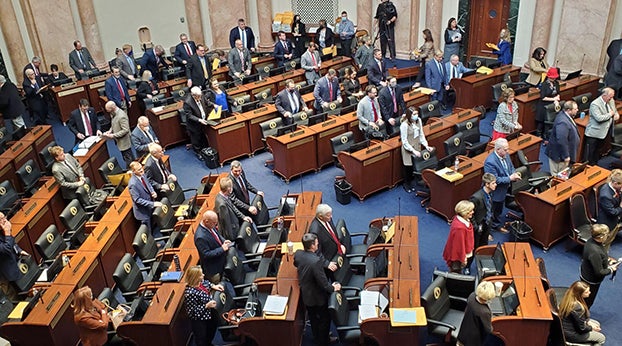Legislature sends Beshear bill decriminalizing medical mistakes
Published 2:30 pm Friday, April 5, 2024

- Kentucky legislators in session. - Kentucky Today
By Sarah Ladd
Kentucky Lantern
A bill giving Kentucky’s health-care providers criminal immunity for medical mistakes — which one lawmaker thinks will enshrine protections for in vitro fertilization by default — is on its way to Gov. Andy Beshear’s desk.
House Bill 159, which would decriminalize medical mistakes made by health care providers, passed the House in February by a vote of 94-0. On Friday it cleared the Senate — also without dissent.
The bill follows a 2022 Tennessee case in which a nurse was found guilty after a patient died from a medical mistake. The conviction led to protests and resignations within the health care community, KFF Health News has reported.
The Kentucky Nurses Association says that if medical mistakes are criminalized, providers are less likely to report them.
“I’m all for responsibility for medical errors,” said Sen. Phillip Wheeler, R-Pikeville, who carried the bill to the Senate floor on the 54th day of the 60-day legislative session. “I think that that is an appropriate domain for civil justice and not for the criminal justice system.”
Republican Sen. Whitney Westerfield, who in February filed a bill seeking to protect access to in vitro fertilization in Kentucky, said he believes HB 159 will accomplish his goal by default. His colleague, Sen. Cassie Chambers Armstrong, D-Louisville, filed a similar bill to protect IVF.
“Neither of our bills have advanced,” Westerfield said while voting in favor of HB 159, which he said will cover IVF access because of its “broad” definition of the word “providers.”
The criminal-liability bill, sponsored by Rep. Patrick Flannery, R-Olive Hill, protects “a person providing health services” who is appropriately licensed and/or certified.
Bills to protect access to IVF, which is used to treat infertility and can help other people trying to get pregnant to do so, came this session in response to a ruling from the Alabama Supreme Court stating that frozen embryos are children.
The ruling led to concerns that it could deter people in Alabama from attempting to conceive children via IVF, which sometimes involves freezing embryos for future attempts at insemination. Several clinics in Alabama, including the University of Alabama Birmingham, paused IVF treatments and embryo transfers in response to the ruling.
Westerfield, of Christian County, said House Bill 159 will protect IVF.






